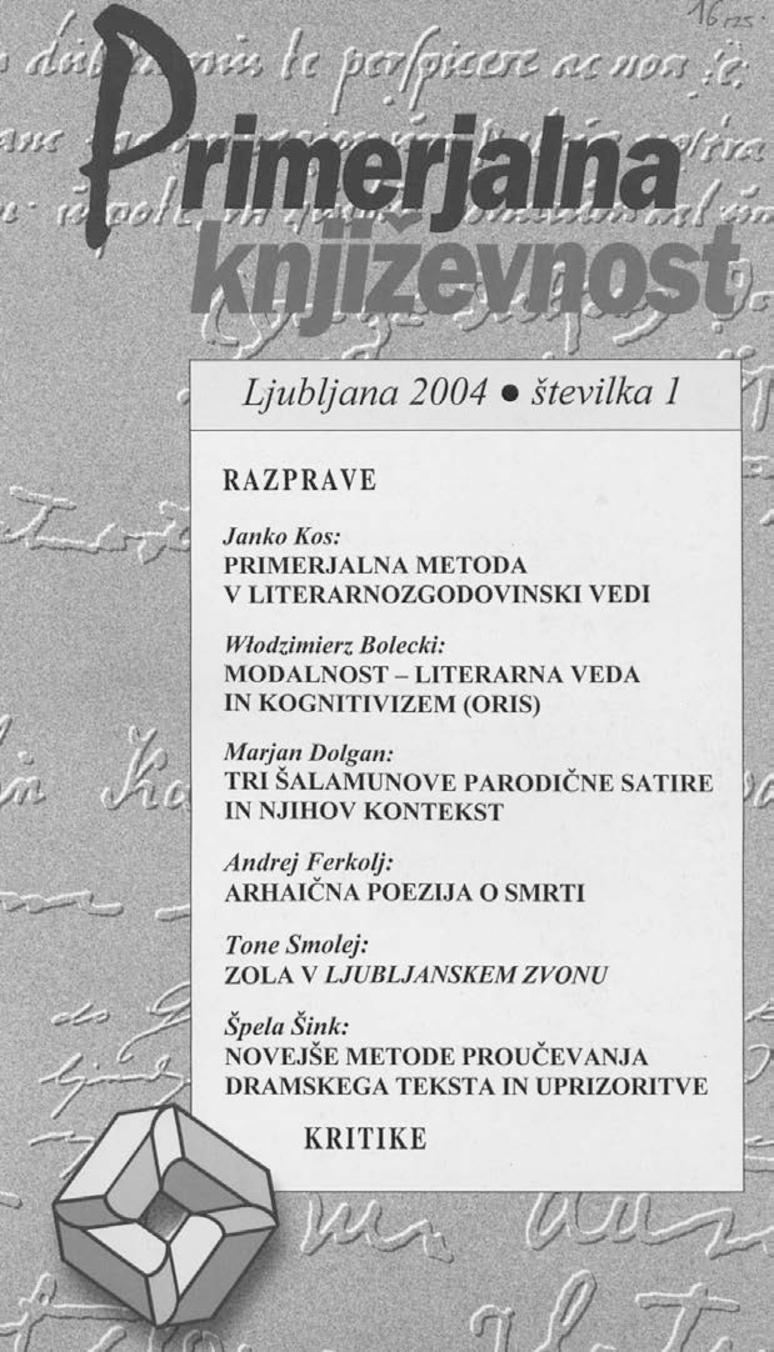Archaic Poetry on Death
Keywords:
literary science, cultural anthropology, hermeneutics, folk literature, oral literature, archaic poetry, deathAbstract
Despite its specific characteristics, archaic poetry has been studied alongside oral poetry of the European nations. But researchers who deal with archaic poetry should be aware of the fact that oral poetry represents the entire literary production of the archaic nations and not only a part of it, as is the case with oral poetry of the European nations. Most of archaic poetry is accessible only in the form of translated written text, so we cannot deal with its original feature. When reading and interpreting archaic poetry, the variety of communicative codes should be taken into account, while one can with no serious consequences ignore the syncretic union of a text, melody, music and movement, dealing with each aspect separately. Authors of archaic poetry were highly appreciated individuals, and the poetic creation was considered a conscious process of verbal expression comparable to the most important social achievements. Most poems could be conditionally classified as lyrics. In classifying them according to literary types, a combination of motive-thematic and functional model (ritual, hunting and fighting, love, mourning, etc. poems) should be adopted. – According to Gadamer, to understand art, one has to establish an equal dialogue about “the same thing”. In the communication between the tradition of archaic people and today, the phenomenon of death could be viewed as “the same thing”. Individual understanding of death by archaic people in many regards exceeds the established cultural patterns (religion, mythology), according to which death is viewed as a passage to another, better world. Against such social interpretations, and through the medium of art, some outstanding individuals created a non-identical comprehension of death as an unalienable and the most adequate possibility of being. It seems that the phenomenon of death and that of individuality exist in a close relationship and reach their best expression just in archaic poems on death. It is here that through the confrontation with the phenomenon of “death of mine” the process of individualization takes place. The subjects of this process are some “extraordinary individuals” (poets). Besides, one can find in these poems the birth of fiction in the modern sense, not only because the theme of “death of mine” represents imaginary objects which have no “appropriate”, or in any way graspable meaning, but also because of the oral character of archaic poetry which is particularly suitable for the growth (and re-creation) of fiction. The interpretation of poems has proved that among archaic people fiction had a great existential meaning in the ordinary life of “extraordinary individuals” because it gave them the opportunity to emphasize their individuality beyond a real conflict with society. The contemporary crisis of individuality is undoubtedly closely connected with the growing tabooization of the phenomenon of death, which tums out blindness for death. In spite of its apparent naivety, archaic poetry on death provides a more genuine answer to the being-question How to accept my own death. It answers with the courage for death and for this reason it does deserve our attention.References
ARIÈS Philippe, 1975: Essais sur l’histoire de la mori en Occident du Moyen Age à nos jours, Éditions du Seuil, Pariz.
ARIJES Filip, 1989: Eseji o istoriji smrti na Zapadu, Rad, Beograd.
BOHANEC Franček (ur.), 1968: Sredi zemlje stojim, Mladinska knjiga, Ljubljana.
BOWRA Maurice, 1962: The Primitive Song, Mentor Book, London.
BAUSINGER Herman, 1987: »Jezik v etnologiji«, Traditiones 16, str. 35–49, Ljubljana.
DAY Grove, 1964: The Sky Clears: Poetry of the American Indians, University of Nebraska, Lincoln.
DOLINAR Darko, 2001: »Gadamer, filozofska hermenevtika in znanosti«, v: Gadamer, str. 445–468.
DOLINAR Darko, 1991: Hermenevtika in literarna veda, DZS, Ljubljana.
DUDLEY Edward (ur.), 1972: The Wild Man Within, University of Pittsburgh Press, London.
ELIADE Mircea, 1981: Okultizam, magija i pomodne kulture, Grafički zavod Hrvatske, Zagreb.
ELIADE Mircea, 1992: Kozmos in zgodovina, Nova revija, Ljubljana.
FREUCHEN Peter, 1960: Peter Freuchen’s Book of the Eskimos, New York.
GADAMER Hans-Georg, 1999: Izbrani spisi, Nova revija, Ljubljana.
GADAMER Hans-Georg, 2001: Resnica in metoda, Literarno-umetniško društvo Literatura, Ljubljana.
GOLOB Zvonimir (ur.), 1954: Amuleti, Nolit, Beograd.
GOLOB Zvonimir, 1954: »Pjesme ’primitivnih’ naroda«, v: Golob, str. 5–16.
GOLJEVŠČEK Alenka, 1977: »Struktura mitologije«, Anthropos, št. 5–6, str. 131–158.
GOODY Jack, 1977: The Domestication of the Savage Mind, Cambridge University Press, Cambridge.
HEIDEGGER Martin, 1967: Izbrane razprave, Cankarjeva založba, Ljubljana.
HEIDEGGER Martin, 1997: Bit in čas, Slovenska matica, Ljubljana.
ISER Wolfgang, 2001: Bralno dejanje, Studia humanitatis, Ljubljana.
ISER WoIfgang, 1997: »The Significance of Fictionalizing«, Anthropoetics 3, št. 2, Irvine.
JAKOBSON Roman, 1966: Lingvistika i poetika, Nolit, Beograd.
JAUß Hans Robert, 1998: Estetsko izkustvo in literarna hermenevtika, Literarno-umetniško društvo Literatura, Ljubljana.
KOS Janko, 1993: Lirika, DZS, Ljubljana.
KOS Janko, 1996: Očrt literarne teorije, DZS, Ljubljana.
LÉVI-STRAUSS Claude, 1994: Rasa in zgodovina; Totemizem danes, Studia humanitatis, Ljubljana.
MALINOWSKI Bronisław, 1969: »Smrt i reintegracija grupe«, v: Parsons, str. 898–901.
MORIN Edgar, 1981: Čovek i smrt, Beogradski izdavačko-grafički zavod, Beograd.
PARSONS Talcott (ur.), 1969: Teorije o društvu, Vuk Karađić, Beograd.
PETKOVIĆ Zoran, 1990: Ristič Mihajlo (ur.): ’Vakan’tanka me čuje’: Pjesme i priče sevemoameričkih Indijanaca, Novo slovo, Beograd.
RICOEUR Paul, 1986: Du texte à l’action, Éditions du Seuil, Pariz.
SAJAM A Seppo, 1994: Misel in smisel, Znanstveno in publicistično središče, Ljubljana.
STANONIK Marija, 2001: »Antropološki vidik slovstvene folklore«, Glasnik S.E.D., št. 1–2, str. 121–133, Ljubljana.
ŠTERK Karmen, 1998: O težavah z mano, Študentska založba, Ljubljana.
ŠARČEVIČ Abdulah (ur.), 1986: Filozofija modernog doba, V. Masleša, Sarajevo.
ŠKERLJ Božo, 1962: Ljudstva brez kovin, DZS, Ljubljana.
TELBAN Borut, 2001: Andaypa, Založba Obzorja, Maribor.
TERSEGLAV Marko, 1987: Ljudsko pesništvo, DZS, Ljubljana.
von USLAR Detleva, 1986: »Svijet kao prostor čovijeka (Spinoza, Leibniz, Schelling, Heidegger)«, v: Šarčević.
VIRK Tomo, 1988: »Wolfgang Iser: funkcija, učinek, imaginarno«, Nova revija, št. 71–72, str. 536–544, Ljubljana.
VIRK Tomo, 1995: Ujetniki bolečine, Mihelač, Ljubljana.
VIRK Tomo, 1998: »Hans Robert JauB in recepcijska estetika«, v: Jauß, str. 531–538.
VIRK Tomo, 1999: Moderne metode literarne vede, Filozofska fakulteta, Ljubljana.


